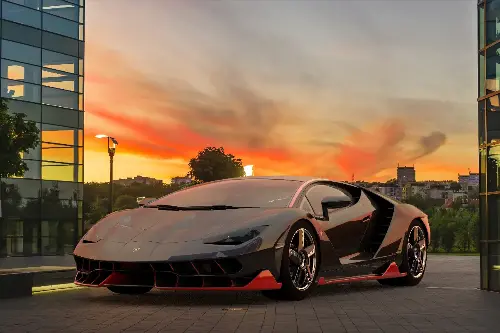In the fast-paced world of automotive innovation, electric vehicles (EVs) are accelerating to the forefront. Yet, amid this electric surge, Italian luxury sports car manufacturer Lamborghini remains steadfast in its commitment to gasoline-powered thrills. This might come as a surprise at a time when competitors and even governments are pushing for a greener future. So, why is now not the time for Lamborghini to make the shift to electric?

Lamborghini's Identity and Driving Experience
For Lamborghini, it's a matter of identity and driving experience, two elements deeply ingrained in the marque's DNA. The mere mention of Lamborghini conjures images of sleek, roaring supercars—synonymous with power, performance, and the raw emotional appeal of an internal combustion engine. Here lies Lamborghini's conviction: the roar of the engine, the tactile feedback of the driving experience, and the surge of power that only a gasoline engine can currently deliver are intrinsic to its brand promise.
The Sensory Appeal of Gasoline Engines
The visceral experience of driving a Lamborghini is not just about transportation, it's about passion, excitement, and the sensual symphony played by a naturally aspirated V12 or a twin-turbo V8. This is what Lambo, as it's affectionately known by enthusiasts, fears might be diluted in an electric future that, while impressive in torque and environmental benefits, may lack the emotive soundtrack that has defined supercar culture.
Moreover, the Lamborghini clientele, with their penchant for exclusive and heart-pumping experiences, have shown a strong preference for traditional engines. These customers are willing to pay a premium not just for the Lamborghini crest, but for the unadulterated joy that comes from the growl of an Aventador or the sharp response of a Huracán's throttle. Such attributes are challenging to replicate with EV technology, which, despite its advancements, still operates in near silence.
Infrastructure and Technology Challenges
There are also considerations of infrastructure and technology maturity. While EVs are indeed the future, widespread adaptability, especially in the supercar segment, is dependent on a robust charging network and battery technology that can withstand high-performance demands without compromising range. Lamborghini is wary of adopting technology that may, at present, fall short of its high benchmark for performance and customer satisfaction.
Transition to Hybridisation
However, it's not to say that Lamborghini is snubbing the electric movement entirely. In fact, the company has begun taking steps towards hybridisation—a transitional strategy that resonates with many supercar manufacturers. The Sián FKP 37, Lamborghini’s first foray into electrification, melds a V12 engine with a supercapacitor to enhance performance while reducing emissions. This indicates an openness to innovation, but on Lamborghini's own terms, marrying traditional fuel with electric to serve as a bridge before committing entirely to an electric lineup.
Performance and Engineering Challenges
But there are significant challenges to consider, such as weight, which is the sworn enemy of performance. Electric and hybrid powertrains are substantially heavier than their gasoline counterparts, which could affect handling and speed—attributes that are non-negotiables to Lamborghini's engineering and design ethos. Overcoming such hurdles without compromising on the brand's core philosophy is a task that the Raging Bull takes seriously.
Regulatory Pressures and Future Plans
Another aspect that cannot be overlooked is the regulatory environment. As governments worldwide set ambitious targets to reduce carbon emissions, Lamborghini is aware that it cannot swim against the tide indefinitely. But the brand is playing a long game, choosing to invest in research and development to ensure that when it does step into the electric arena, it will do so with a product that's unmistakably Lamborghini in spirit and performance.
To that end, Lamborghini has already announced a roadmap for electrification, with the aim of launching its first all-electric car in the latter half of this decade. Until then, the brand is committed to refining its gasoline engines and hybrid systems, promising that even these will carry the unmistakable heartbeat of a Lamborghini.
Nevertheless, it remains to be seen how Lamborghini's conviction will play out in the reality of an ever-evolving automotive landscape. Will the insistence on gasoline-powered thrills resonate long-term, or will it be seen as a defiant last stand in the face of an inevitable electrified future? Only time will tell, but for now, Lambo continues to serve its discerning clientele the gasoline thrills over electric chills, maintaining a high-octane ride into its own carefully curated future.
